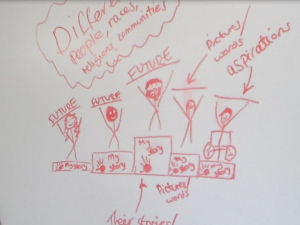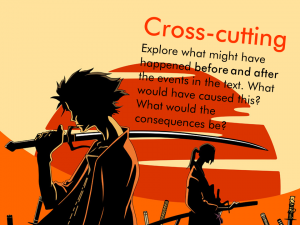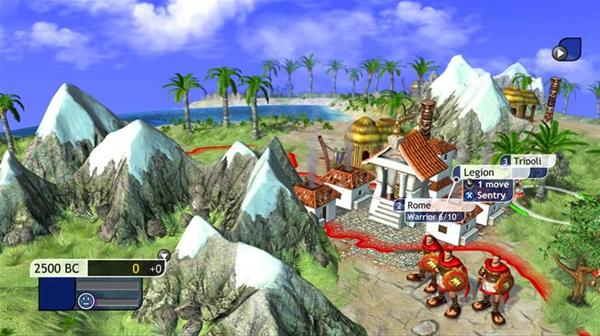Since September I have been looking at effective student behaviours with fresh eyes. This was triggered largely by my rereading of ‘Teaching for Effective Learning‘ – a collection of ideas from the Project for Enchancing Effective Learning (PEEL). Continue reading Improving Extended Writing: the TOWER Model
Category: Creativity
How Stories in the Classroom Can Lead to Meaningful Learning
Extract from The Exam Class Toolkit: How to Create Engaging Lesson That Ensure Progression and Results (Continuum). This section is a snapshot on using stories in the classroom.
The following story was emailed to us recently. At first it may seem just like a
funny story, but if you read between the lines, it raises several interesting
questions. Can you spot them?
An old Maori man lived alone at his family home out in Ruatoria.
He wanted to dig his kumara garden, but it was very hard work.
His only son, Hone, who used to help him, was in Paremoremo prison.
The man wrote a letter to his son and described his predicament.
Kia ora e Hone,
I am feeling pretty bad because it looks like I won’t be able to
plant my kumara garden this year.
I’m just getting too old to be digging up a garden plot.
If you were here, all my troubles would be over.
I know you would dig the plot for me.
Aroha nui
Papa
A few days later he received a letter from his son.
E Pa,
For God’s sake! Don’t dig up that garden, that’s where I buried the BODIES.
Love
Hone
At 4am the next morning, Gisborne C.I.B and the local police showed up with a search warrant and dug up the entire area without finding any
bodies. They apologized to the old man and left. That same day the man received another letter from his son.
E Pa,
Go ahead and plant the Kumara.
That’s the best I could do under the circumstances.
Love
Hone
Continue reading How Stories in the Classroom Can Lead to Meaningful Learning
Letting Go: Student Designed Project Based Learning
Listening to the stories of Holocaust survivors is always inspirational, but today (Tuseday 25th September) was more enlightening than usual.
Along with colleague Rosie Sheldrake, I took a group of Year 9 students to an oral history event at Essex University, in memory of the late Dora Love. The original plan was to give students access to quality material for a Holocaust project that we would define later, however, as the day unfolded, we decided to hand over the whole process of project design to the students – something we have not done before.
Below is a quick explanation of how we went about it… Continue reading Letting Go: Student Designed Project Based Learning
Dramatic Resources for Reading Texts in the Classroom
In June I had the pleasure of spending some time with Avner Segall from Michigan State University. He talked about how teachers try very hard to add layers of pedagogy to lessons and often ignore the pedagogy implicit and hidden within the texts they use. He demonstrated how unpicking text, its motives and choices can give teachers all the material they need to create exciting learning. This made a great impact on me, but I was unable to fully translate it into classroom practice. Then, in July I completed an in-house coaching cycle and spent time working with a fantastic Drama teacher called Alex. In the lesson that I observed, she had eight ‘Explorative Strategies’ on display around the board. Students were given a scene from Oliver the Musical and asked to explore it using one or more of the strategies. The students were obviously familiar with the process, but the results were stunning. They were digging deep into the text and asking some very precise questions about its purpose and significance. Continue reading Dramatic Resources for Reading Texts in the Classroom
Five Reasons to Play PS3 in A Level Lessons
I have recently bought a PS3 for my classroom and, yes, it did raise a few eyebrows at first. In fact, several weeks on and it still seems to create the same reaction in some people. However, it was the response of the students that most interested me. The first game that I experimented with was Sid Meier’s Civilization Revolution.
I had wanted to use it for a while to help teach the Tudors unit at AS Level. One of the key teaching points of the unit is how Monarchs governed their states and I was fairly sure that it could help students get a feel for the mindset of the Early Modern Period.
The results were fascinating and made a real impact. However, I don’t want to go into the whole defence of game based learning, or even explain how it can be used to create a real enquiry (that has been done with much greater eloquence than I could muster by the likes of Dawn Hallybone). All I want to set out here is five simple reasons why we should be using games to teach through at post-16:
1. It is great for teaching concepts – so far we have used it to launch the Tudor unit in Year 12 (looking at the concept of kingship), the Crime and Punishment unit at Year 13 (using the CSI game to look at the concept of investigation) and with Year 7 to look at Chronology (using the History extension pack of Little Big Planet). The initial playing generated a lot of excitement, but the discussion that followed was the really amazing part. Students were able to provide concrete (allbeit digitally rendered) examples to back up and explain abstract concepts. It was brilliant to hear three Year 12 students discussing why it was virtually impossible to create a state noted for culture while engaged in a protracted war, or why it was futile to build a banking system when most spare cash was being spent on an invasion army. The game had managed to solidify thinking on a difficult concept in less than two hours – it would have taken weeks for me to feed them enough contextual knowledge to reach the same point. This approach is one that I want to hang on to. I can not see me using the PS3 as a straight tool for learning about a particular time period or skill – that seems to take out the excitement and the thinking. It was the connections that had to be made and the abstract nature of the thinking that made this work.
2. It doubles up as a blu-ray – the advantages of blu-ray are documented widely, but having that technology available in the room is superb. Buying a separate player would cost just as much and the PS3 has more to offer the class. It means that we can show clips that create much more atmosphere. For example, when looking at the changing landscape of crime drama we show two clips from Alfred Hitchcock’s ‘Psycho’. Seeing this in high definition is fantastic, but it also shows the students that you care about the presentation of the sources of information you use. Carrying the box with reverance and carefully placing it in the player adds to the drama and makes them care more about the content. Honestly, design and presentation matter an awful lot in post-16 teaching.
3. If you have wifi, it is a cheap way to get internet access – the fact that it is almost a pc at a fraction of the cost is superb. For less than £200 you can get access to a host of web resources and use them in lessons. If you want a cheap way to play video clips or show striking images, then the PS3 has got to be a serious consideration. It is another access point to help students look up and clarify those small issues that arise when they are involved with completing an enquiry. The novelty of doing this additional research on the PS3 has proven engaging too.
4. It creates a buzz among students – the amount of comments I have received since the PS3 landed at school is incredible. The students think it is brilliant that the History department has one and the teachers actually know how to play the games. One student (Year 12) wrote on the VLE ‘History + PS3 = Cool’. I have to agree.
5. It is a technology that is constantly evolving – with the recent introduction was motion and visualising technology the PS3 has opened up a new avenue of use for the classroom. I don’t know how well it will work for what we need to teach, but it will be fun to explore this with the students. And the best part is that new games and hardware to connect to the PS3 will emerge every year so that we can keep offering a variety of approaches and remain fresh. We should not abandon the principles of play and exploration at KS3 – keeping the learning active, engaging and different is as vital at post-16 as it is with Year 6 or 7 and using a games console is just one way to bring this into the classroom.
These five points are not an advert for PS3 consoles, although I obviously do like mine, more an attempt explore games based learning and student engagement at KS5.
Hope it helps.




